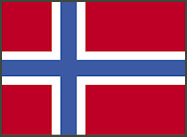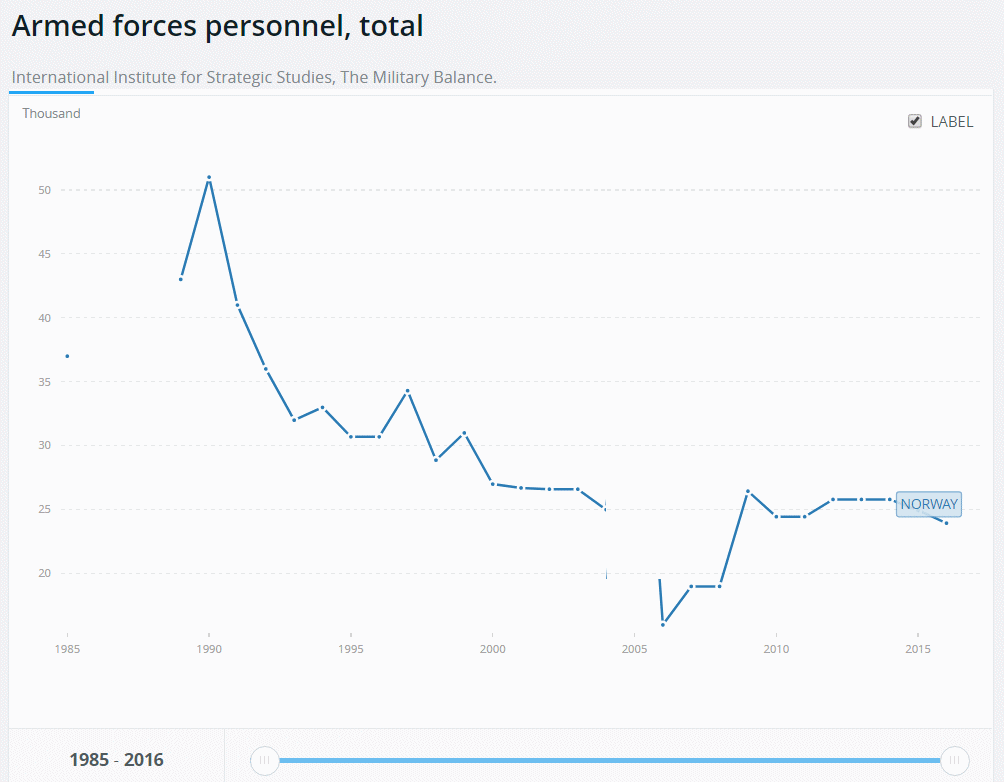Norway - National Service
 According to the Norwegian Constitution, all fit male citizens are obliged to serve in the defence of their country. Liability to military service starts at the age of 19, and continues until the age of 44. It is the operational requirements of the Armed Forces that will determine the number of conscripts undergoing initial military service. The aim of the Armed Forces is to ensure that it is the best qualified and most highly motivated young people who undertake this initial training.
According to the Norwegian Constitution, all fit male citizens are obliged to serve in the defence of their country. Liability to military service starts at the age of 19, and continues until the age of 44. It is the operational requirements of the Armed Forces that will determine the number of conscripts undergoing initial military service. The aim of the Armed Forces is to ensure that it is the best qualified and most highly motivated young people who undertake this initial training.
On 28 March 2008 the Government presented the new long-term plan for the Armed Forces: A Defence for the protection of Norway's security, interests and values. Skill levels will be strengthened substantially and the way is being prepared for an increase in manpower numbers of around 1,000 (from about 16,000 to about 17,000).
In 2009 the Norwegian Parliament adopted a new national service act which states that women have to meet for the conscription board, examination and classification for military service just like men. In order to increase the number of women in the Armed Forces and to make sure the same information about military service is given to all regardless of gender, young women are invited to attend a voluntary initial interview. Conscientious objectors may seek to be exempted from military service and to undertake service in the community in lieu. The highest priority was given to the recruiting of the most suitable young people either for regular service on contract or as junior or full career officers.
In 2012, around 14 percent of Norwegians called in by the Armed Forces were conscripted. The conscription, while mandatory, is easy to get out of and the military recruited only those who were most motivated.
The Norwegian parliament voted in October 2014 by a large majority on a bill aimed at extending mandatory military service to females. If the legislation is approved, all women in the country will be subject to the same conscription conditions as men. The proposition, which was first announced in June 2013, was passed in Oslo with 96 parliamentarians voting in favor of gender equality in the army. Only six voted against it. "We do not really need more conscripts but we wish to extend military service to the entire age group to attract more motivated and more competent recruits," Norwegian Minister of Defense Ine Eriksen Soreide said.
If the bill is enacted, all medically fit women between 19 and 44 years old will have to serve at least 19 months of mandatory duty in the armed forces. It will apply to women born in Norway from 1997 onwards, with the first service in the summer of 2016. Women will also be subject to conscription during wartime. Currently, women constitute just above 10 percent of military conscripts in Norway, serving in the armed forces on a volunteer basis. The initiative of compulsory military service for all citizens regardless of gender makes Norway the first European country to make such a decision in peacetime. Outside Europe, military service is mandatory for both men and women in Israel.
The National Service Administration, on behalf of the Chief of Defence, has responsibility for conscript administration covering all service branches. Its tasks include initial testing, appointments and call-up for initial service. The National Service Administration is also the holding unit for all service personnel records and has a coordinating responsibility for all recruiting to the Armed Forces.
The National Service scheme and the initial period of military service provides the Armed Forces with a very special opportunity to recruit young people into the organisation. At the same time this gives a significant proportion of the population an insight into what the Armed Forces really do. Many young people are carrying out important tasks, perhaps serving with the Border Guard or with the King's Guard, in the course of their national service. The system of National Service has the backing of a very high proportion of the population and that all parties in the Storting would wish to maintain this important social contract between the Armed Forces and the Norwegian people. At the same time this makes it the responsibility to see that the arrangements for national service are adapted to meet the continuously changing needs of a new era.
Improved arrangements for initial interview will make it possible to inform each annual batch of school leavers about the opportunities offered by the Armed Forces, while also providing a selection system which is able to identify and recruit those who are both suitable and best motivated.
The Armed Forces are able to offer a wealth of good educational opportunities in a wide variety of professional areas. Education is a key activity in a defence organisation in which competence is its most important resource. This should not prevent us, however, from continuously assessing how to provide personnel with this competence in the best and most effective way. It must also be clear when selecting candidates for the various schools that this is recruiting into a profession, not simply an educational stream. In fact a profession that entails special dangers as well as challenges.
The number of applicants seeking to join the Armed Forces as a rule varies with the general employment situation. At the moment the Armed Forces are in a good period with an upward trend in the numbers applying for the various educational schemes. The challenge in the future will be to maintain these good figures and to ensure that as many as possible remain in the Armed Forces after their mandatory period of service.
Participation in operations abroad has become a normal part of military service. Taking part in such operations gives the great majority experiences and a competence that they would not have missed for anything. The missions themselves are often experienced as making a highly meaningful contribution while also providing a chance to put to the test one's own skills and attitudes in demanding situations. But many find it hard to live with what they have experienced in operations abroad. This government has strengthened substantially the aftercare available to those returning from such operations.
This work was initiated through the Long-Term Plan for the Armed Forces and was followed up in a Report to the Storting. The report was entitled "From national serviceman to veteran - about taking care of personnel before, during and after participation in operations abroad". This report places particular emphasis on preventive measures, competence building, research and development, collaboration across all sectors of society as well as stronger acknowledgment of what individuals have achieved.
Norway's parliament voted overwhelmingly in June 2013 to conscript women into its armed forces, becoming the first European and first NATO country to make military service compulsory for both genders. On 14 June 2013, exactly 100 years after Norway introduced full voting rights for women, the Norwegian Parliament voted to adopt conscription for women as well as men. – This is an historic day for equality and for our armed forces, says Norway’s Defence Minister, Mrs. Anne-Grete Stroem-Erichsen. With today’s decision, Norway is the only European country with an active practice of gender-neutral conscription.
This is important for two reasons. According to the Ministry of Defense "Male-only conscription is out of synch with the rest of society. All citizens shall have the same rights and obligations, regardless of sex. Secondly, in order to secure our operational capabilities in the future we need to recruit the best, and we need diversity. Therefore we cannot limit our recruitment to the male half of the population", said the Defence Minister.
This does not, however, mean that all women must serve in the military. Norway’s armed forces have an annual requirement for 8-10.000 conscripts out of a total of 60.000 men and women in the relevant age group. Recruitment is already high and increasing, and the number of applicants each year exceeds the needs of the Armed Forces. Women already serve in the military, but do so of their own volition. Norway’s goal is to have 20 percent women in its armed forces by 2020, compared to the share of nine percent in 2013.

|
NEWSLETTER
|
| Join the GlobalSecurity.org mailing list |
|
|
|

